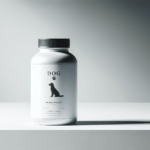
In “What Are the Basic Needs of a Dog?” you’ll learn all about the fundamental requirements to ensure your furry companion leads a happy and healthy life. This friendly guide dives right into the essentials, covering everything from the best diet and hydration practices, to the importance of regular veterinary check-ups, vaccinations, and exercise tailored to your dog’s breed and age. The article also highlights the value of canine health products such as supplements for joint health, omega-3 fatty acids for a shiny coat, and probiotic support for digestion. By the end, you’ll have a solid understanding of what it takes to meet your dog’s basic needs and keep them thriving. Have you ever wondered what the basic needs of a dog are? If you’re a dog owner or thinking about becoming one, it’s natural to want to provide the best care possible for your furry friend. Understanding these needs goes beyond just food and water; it involves a holistic approach to their health and well-being. This article will guide you through everything you need to know to ensure your canine companion thrives.

Nutrition and Diet
Balanced Diet
A balanced diet is crucial for maintaining your dog’s overall health. Dogs require a mix of proteins, fats, carbohydrates, vitamins, and minerals. Ensure the food you provide is appropriate for your dog’s age, weight, and breed.
Dog Food Quality
Not all dog foods are created equal. Look for high-quality ingredients and avoid foods with fillers and artificial additives. Organic dog health products can be an excellent choice for providing optimal nutrition.
| Type of Dog Food | Key Benefits |
|---|---|
| Dry Kibble | Convenient, helps with dental health |
| Wet Canned Food | Higher moisture content, often tastier for dogs |
| Raw Food Diet | Mimics natural diet, can be more nutritious |
| Homemade Dog Food | Allows full control over ingredients, can be tailored to specific needs |
Essential Nutrients
Certain nutrients are key to a dog’s health:
- Proteins: Support muscle growth and repair.
- Fats: Provide energy and support skin health.
- Carbohydrates: Offer a quick energy source.
- Vitamins and Minerals: Essential for various bodily functions.
Supplements
Sometimes, even the best diet needs a boost from supplements to ensure your dog gets all the necessary nutrients.
Popular Supplements
| Supplement | Benefits |
|---|---|
| Omega-3 Fatty Acids | Support skin and coat health, reduce inflammation |
| Glucosamine and Chondroitin | Promote joint health |
| Probiotics | Improve digestive health |
| Multivitamins | Fill in dietary gaps |
Physical Health and Exercise
Regular Veterinary Check-ups
Routine visits to the veterinarian are crucial. These check-ups can detect issues early and keep vaccinations up-to-date.
Vaccinations
Vaccinations protect your dog from various diseases. Your vet can recommend a vaccination schedule tailored to your dog’s needs.
| Vaccine | Purpose |
|---|---|
| Rabies | Prevents rabies infection |
| DHPP | Protects against distemper, hepatitis, parainfluenza, and parvovirus |
| Leptospirosis | Prevents bacterial infection |
Physical Exercise
Exercise is vital for maintaining a healthy weight and mental well-being. The type and amount of exercise your dog needs will depend on their breed, age, and health.
Types of Exercise
| Exercise Type | Suitable For |
|---|---|
| Walking | All dogs |
| Running | Active dogs, high-energy breeds |
| Swimming | Dogs with joint issues, breeds that love water |
| Agility Training | Intelligent and active dogs |
Dental Health
Dental health is often overlooked but is critical for your dog’s overall well-being. Regular dental cleanings can prevent issues like gum disease and tooth decay.
Dental Hygiene
Brush your dog’s teeth regularly and consider dental chews to help maintain oral health.
Mental Health and Enrichment
Mental Stimulation
Just like physical exercise, mental stimulation is essential. Dogs need activities that challenge their minds to prevent boredom and anxiety.
Enrichment Activities
| Activity | Benefits |
|---|---|
| Puzzle Toys | Challenge their minds, reduce boredom |
| Training Sessions | Enhance their skills, provide mental exercise |
| Scent Games | Utilize their natural sniffing abilities |
Socialization
Interaction with Other Dogs and Humans
Socialization is vital for a well-adjusted dog. Positive interactions with other dogs and humans help build confidence and reduce fear and aggression.
Socialization Tips
Introduce your dog to new experiences gradually. Positive reinforcement and treats can make the process smoother.
Obedience Training
Training your dog in basic commands not only makes life easier but also ensures their safety. Commands like “sit,” “stay,” “come,” and “leave it” are essential.

Grooming
Regular Grooming
Keeping your dog clean and well-groomed promotes good health and minimizes the risk of infections.
Grooming Practices
| Grooming Activity | Frequency |
|---|---|
| Brushing | Daily or weekly, depending on coat type |
| Bathing | Every 4-6 weeks or as needed |
| Nail Trimming | Every 3-4 weeks |
| Ear Cleaning | Monthly or as needed |
Creating a Safe Environment
Safe Living Space
Your home should be a safe haven for your dog. Remove any hazards and ensure they have a comfortable place to sleep.
Dog-Proofing Your Home
Make sure harmful substances and small objects are out of reach. Secure trash cans and use baby gates if necessary.
Identification
Ensure your dog always wears a collar with an ID tag, and consider microchipping as a more permanent form of identification.

Health Monitoring
Observing Your Dog
Being vigilant about your dog’s behavior can help you identify health issues early. Keep an eye on their eating habits, bowel movements, and energy levels.
Signs of Health Issues
| Symptom | Possible Cause |
|---|---|
| Lethargy | Illness, poor diet, lack of exercise |
| Diarrhea or Vomiting | Digestive issues, food allergies |
| Excessive Scratching | Fleas, skin allergies |
| Limping | Joint issues, injury |
When to See a Veterinarian
If you notice any unusual symptoms or behaviors in your dog, consult your veterinarian immediately.
Special Considerations
Senior Dogs
Older dogs have different needs compared to young dogs. They may require joint supplements, a different diet, and more frequent vet visits.
Puppies
Puppies need a diet rich in essential nutrients to support their rapid growth. They also require more frequent feedings and vaccinations.
Breed-Specific Needs
Different breeds may have specific health concerns. Researching your dog’s breed can provide valuable insights into their unique needs.
Conclusion
Understanding and meeting the basic needs of a dog requires dedication and knowledge. From nutrition and exercise to mental stimulation and veterinary care, each aspect plays a crucial role in your dog’s health and happiness. By following these guidelines, you can ensure that your canine companion leads a fulfilling and healthy life.
Remember, your dog relies on you for everything. Providing the right care, love, and attention will not only make them happy but also strengthen the bond you share. So, are you ready to give your dog the best life possible?







